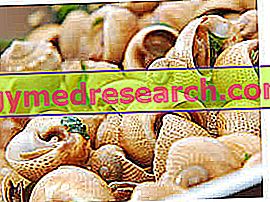
E160d-LICOPINE or LICOPENE (CI 75125)
Lycopene is a food additive formed only of hydrogen and carbon, belonging to the group of carotenoids. It is a red-colored dye of natural origin (obtained from tomatoes).
It is important to emphasize that the quantity of lycopene present in the tomato depends on the degree of ripeness of the same. It has been calculated, in fact, that within the mature red tomatoes there are about 50 mg of lycopene per kg of product, while the concentration drops to 5 mg / kg in the less mature yellow varieties.
In addition to tomatoes, lycopene is present in melons, guava, pink grapefruit, red oranges, carrots, apricots, etc. Its concentrations in human serum, on the other hand, depend on the intake of these raw materials.
The absorption of lycopene, being a lipophilic substance, is related to the presence of lipids in the diet: dietary fats, in fact, favor intestinal absorption.
The cooking of foods (such as tomato sauces, peeled tomatoes ...) increases the bioavailability of this substance, thanks to the separation of the protein complexes in which it is incorporated, and to the dispersion of the crystalline aggregates of carotenoids. In this way, the consumption of lycopene is possible even in the moments in which its bringing foods are not available because they are not in season.
Belonging to the group of carotenoids, lycopene has a very high antioxidant capacity and for this reason it is very interesting for its possible therapeutic applications: it seems, in fact, to be the most efficient oxygen quencher among the carotenoids (thanks to its structure, in the presence, that is, of two further double bonds with respect to the structure of the other carotenoids).
Due to its antioxidant properties, it is likely that the intake of lycopene can play an important role also to prevent cellular aging, cardiovascular diseases and the onset of uncontrolled cell proliferation processes (it has tumor prevention activities as well as other carotenoids ).
American studies have shown that frequent consumption of tomato-based products reduces the risk of prostate cancer, and that high levels of lycopene can reduce the risk of cervical cancer by up to five times.
It seems that lycopene used as an additive is not harmful and has no side effects.
ADI DOSE: /
| E100 | E101 | E101a | E102 | E104 | E110 | E120 | E122 |
| E123 | E124 | E127 | E128 | E129 | E131 | E132 | E133 |
| E140 | E141 | E142 | E150a | E150b | E150c | E150d | E151 |
| E153 | E154 | E155 | E160a | E160b | E160c | E160d | E160e |
| E160f | E161 | E161a | E161b | E161c | E161d | E161e | E161f |
| E161g | E162 | E163 | E170 | E171 | E172 | E173 | E174 |
| E175 | E180 |




